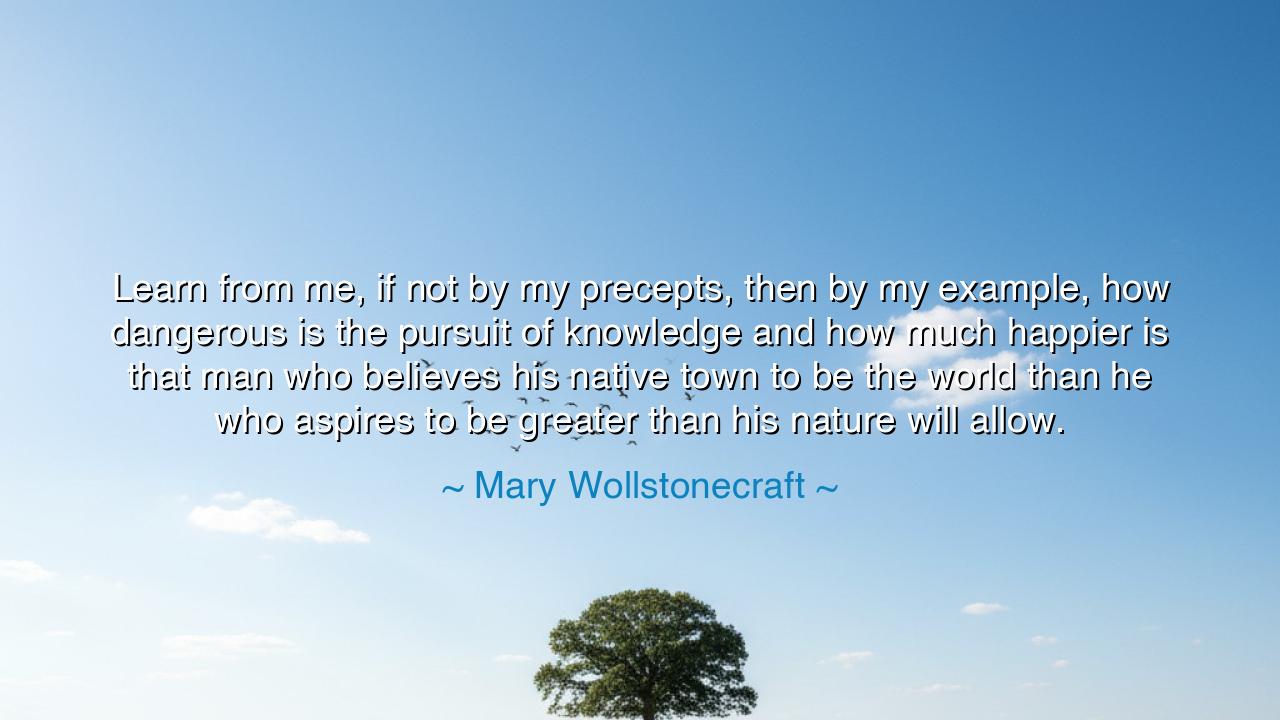
Learn from me, if not by my precepts, then by my example, how
Learn from me, if not by my precepts, then by my example, how dangerous is the pursuit of knowledge and how much happier is that man who believes his native town to be the world than he who aspires to be greater than his nature will allow.






Mary Wollstonecraft, a voice of fire in an age of restraint, wrote words that have thundered through the centuries: “Learn from me, if not by my precepts, then by my example, how dangerous is the pursuit of knowledge and how much happier is that man who believes his native town to be the world than he who aspires to be greater than his nature will allow.” In this passage, she captures the paradox of human striving: that knowledge, though luminous, may also wound; that ambition, though noble, may also destroy; and that sometimes, simplicity may grant more peace than greatness ever can.
The ancients, too, wrestled with this truth. Prometheus stole fire from the gods, and with it brought light and progress to humankind, but he was chained to a rock in torment for daring to overreach. Icarus, flying on wings of wax, soared too near the sun, intoxicated by the heights, only to fall into the sea. Wollstonecraft’s warning bears the same lesson: that to seek beyond the limits of one’s nature carries both glory and peril. The human heart burns for knowledge, yet that same fire may consume those who do not handle it with humility.
In her words, we hear not only philosophy but lived pain. For Wollstonecraft, who challenged the conventions of her time, often walked the knife’s edge between brilliance and despair. Her own life bore witness to the dangers of stepping beyond the narrow confines of society’s expectations. To reach for greatness, to demand justice, to hunger for knowledge in an age that denied women their share of it—this was both her triumph and her torment. Her warning, then, is not the rejection of knowledge, but a recognition of its weight: that the pursuit of truth is never free of cost.
Consider the tale of Victor Frankenstein, the tragic hero of her daughter Mary Shelley’s novel. He embodies the very principle Wollstonecraft spoke of: a man who could not be content with the ordinary, who sought to master the mysteries of life itself. Yet his ambition, greater than his nature could bear, led not to glory but to horror and ruin. Here we see the same warning: that to stretch too far without wisdom or restraint can destroy both the seeker and all who surround him.
Yet her words are not merely caution, but balance. For Wollstonecraft does not counsel ignorance, nor praise those who shun growth. Rather, she reminds us that happiness may be found not only in greatness, but in contentment. The man who believes his “native town to be the world” is not mocked but honored—for in his simplicity, he escapes the restlessness that gnaws at the ambitious. There is dignity, she teaches, in accepting the boundaries of our nature, just as there is danger in denying them.
The lesson for us is sharp and luminous: seek knowledge, yes, but do not worship it blindly. Let ambition inspire, but do not let it consume. Be wary of overreaching pride, for there is wisdom in recognizing both the grandeur and the limits of our human state. Strive, but also rest; question, but also accept. For joy lies not only in conquest but in harmony between desire and nature.
Practical actions follow from this. Cultivate knowledge with humility, never forgetting the costs it may bring. Pursue growth, but be mindful of balance—guard your health, your relationships, your peace. Be content sometimes with the small circle of your life, the “native town” of your existence, seeing in it not confinement but treasure. And when you feel the fire of ambition rise too high, pause, and ask: Does this striving serve life, or does it destroy it?
Thus, children of the future, remember Wollstonecraft’s cry. The pursuit of knowledge is both blessing and burden. Honor it, but handle it with reverence, lest it consume you. Find happiness not only in greatness but in simplicity, and learn that the highest wisdom is not only to soar, but also to know when to rest your wings. For in that balance lies both peace and true greatness.






AAdministratorAdministrator
Welcome, honored guests. Please leave a comment, we will respond soon